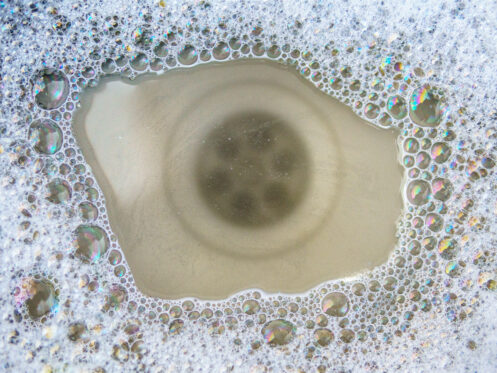One unfortunate issue that almost every homeowner faces at some point is a clogged drain in their home. It could be a clogged sink drain or a clogged kitchen drain. A clogged kitchen or bathroom drain can lead to slow drainage, foul odors, water backups, and potential pipe damage.
It may cause leaks, mold growth, and unsanitary conditions, requiring professional drain cleaning to prevent costly repairs. After searching the internet, you may have come across a suggestion to use a combination of vinegar and baking soda to clear out unwanted clogs. Here is everything you should know about the mixture and the results.
How to Make the Solution
You don’t want to just pour vinegar and baking soda down your drain and hope it works. You need to follow a specific process to create this vinegar and baking soda solution to give it the best chance of successfully unclogging your drain. Start by boiling some water and pouring it down the drain to help loosen the debris that is stuck. Pour about half a cup of baking soda and around one cup of white vinegar into your drain. After pouring this solution down the drain, be sure to place the drain plug or cover the drain with a cloth to restrict airflow.
After about 10 to 15 minutes, the fizzing reaction of the vinegar and baking soda solution should help break down grime, grease, and other gel-like materials that may be holding together the debris causing your clog. Try flushing hot water down the drain after this waiting period to see if your drain is unclogged. This baking soda and vinegar solution tends to work well on minor clogs caused by soap scum, grease, and light buildups of debris in your drain line. In fact, this solution is great for regular odor control and routine drain maintenance.
It Doesn’t Always Work
As with most DIY home solutions, this vinegar and baking soda mixture may not always be effective in unclogging your drain. If there is a significant buildup of solid objects, such as hair and toilet paper, then this method may not yield successful results. Fortunately, several alternative solutions are available to help unclog your drain.
Plunging for Standing Water
If you have standing water in your sink or toilet, one of the first methods you should implement is using a plunger. It’s important to realize that there are different sizes of plungers depending on the location where you’re trying to use them. Toilet plungers are much larger than those used for sinks. Ensure that you have a good, tight connection when you force down the plunger, and then vigorously plunge back and forth for a few moments to help loosen the debris. Finally, pull the plunger off to relieve its seal, and you should see a gush of water go down the drain.
Drain Snake
There are household drain snakes that you can purchase, which are comprised of flexible metal tubing that can be fed down your drain. At the end of the metal tubing, there will be a specific head responsible for breaking up any deep blockages in your line. While drain snakes can be somewhat effective, they can also cause a lot of damage if not used correctly. In most instances, you’re better off relying on a professional plumber to remove the clog instead of risking it by using a drain snake.
Chemical Drain Cleaners
One other solution that you may find people recommending online is a chemical drain cleaner. These are chemical solutions that you simply pour down the drain, and they are supposed to eat away at the clog until water can finally flow through and push the rest of the debris down your sewer line. Unfortunately, the same chemicals that can eat away at the debris clogging your line can also cause permanent damage to your piping. Most plumbing professionals do not recommend using any sort of chemical drain cleaners to protect the overall integrity of your plumbing system.
Calling in the Professionals
If you’re unable to unclog your drain using the safe methods we discussed above, it’s best to rely on one of our plumbing professionals to handle the unclogging process for you. We have specialized tools that are very safe for your piping while being highly effective at removing buildup debris. Often, a plumbing inspection camera is inserted into your drain to locate the clog in your system.
One of the most popular services for removing a clog is hydro jetting, in which high-pressure water is forced through your sewer line to eliminate debris buildup. This method is not only effective for removing debris like soap scum and hair but also for eliminating ice and even tree roots that have intruded into your sewer line.
Things to Avoid Putting Down Your Drain
One of the best ways to avoid dealing with a plumbing clog is to simply be careful about what you put down your drain. Certain items lead to a higher chance of clogging than others. Ideally, you should avoid putting any grease, fat, or oil down your drain. While these may be liquid when they first go down, they will quickly turn into a gel-like substance as they cool off. This can cause them to attract other debris that comes down your drain, such as hair and toilet paper.
When it comes to your toilets, it’s very important not to flush any feminine hygiene products or flushable wipes. Contrary to what their name suggests, these wipes tend to get stuck inside piping and create clogging issues. Other items to avoid putting down your drain include eggshells, coffee grounds, pasta, bones, food scraps, fruit peels, and paint. Using drain strainers is an excellent way to prevent many items, like hair and fruit seeds, from going down your drain.
Getting Preventative Plumbing Maintenance
Another effective tactic to reduce the risk of experiencing a clog in your drain or sewer line is to schedule preventative maintenance service. The same hydro jetting service that can break up a clog can also be highly effective in preventing them.
High-pressure water scours the inside of your piping, making it excellent for removing debris buildup. In fact, most plumbing professionals recommend this service at least once a year to significantly decrease the risk of plumbing problems.
Moreover, regular plumbing system inspections provide valuable information about outdated piping. It is quite common for old metal pipes to corrode internally, creating a rough surface that efficiently traps solid items flowing down your drain lines, leading to clogs. By identifying these problem areas, you can make timely repairs to avoid future plumbing issues.
Exceptional Drain Cleaning Service
Fox Heating, Cooling & Plumbing offers exceptional drain cleaning services for the Wheat Ridge, CO, community. We can also assist with all your sewer and pipe repair, replacement, installation, and inspection needs. Simply call us today to schedule your next consultation with one of our helpful plumbers.

